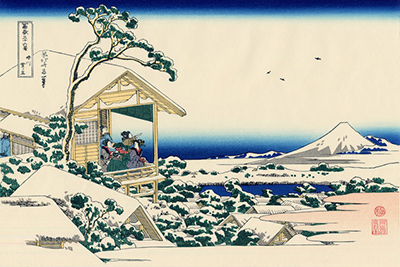Hokusai
Tea house at Koishikawa by Hokusai
Hokusai’s print; Tea at Koishikawa – the morning after a snowfall, is a wonderful example of Hokusai’s ability to evoke an image of the changing nature of the environment. Hokusai highlights the effect of a single snowfall on the landscape; no surface escapes the simple white blanket.
The picture shows a group of men and women on the terrace of a tea house, looking up at Mount Fuji. The tea house might appear to be an innocent location but, at the time Hokusai was working, a tea house was often a place for a couple to meet privately. Nevertheless, as everyone gazes at the transformed landscape, there is a suggestion of awe and wonder at the change brought about by the snowfall.
The print is one of a series of landscapes produced by Hokusai between 1830 and 1832 and collectively entitled Thirty-six Views of Mount Fuji. Hokusai produced these prints when his career was at its peak and the series includes some of his most famous works. David Hockney sited Hokusai’s prints of Mount Fuji as a major influence when he produced a series of pictures based on the weather in 1973, demonstrating Hokusai’s continuing relevance in the modern world.
Katsushika Hokusai (born 1760, died 1849) is one of Japan;s most influential artists. He began his art studies with Katsukawa Shunsho; a well-known Ukiyo-e artist, in 1778. Ukiyo-e can be literally translated as Pictures of the floating world and it is a term used to describe images depicting the sensual, transitory pleasures that people enjoy. Hokusai’s artistic style continued to develop as he got older and he was still creating works of outstanding quality until his death at the age of 90.
His work encompasses a huge variety of subjects and styles, and he is particularly known for his woodblock prints. To produce this kind of print, an image is first drawn on paper and then used to produce a carving on a wooden block. Ink is then applied to the block to transfer the image onto paper. Hokusai used a wide range of colours and a separate block would be needed for each colour.
